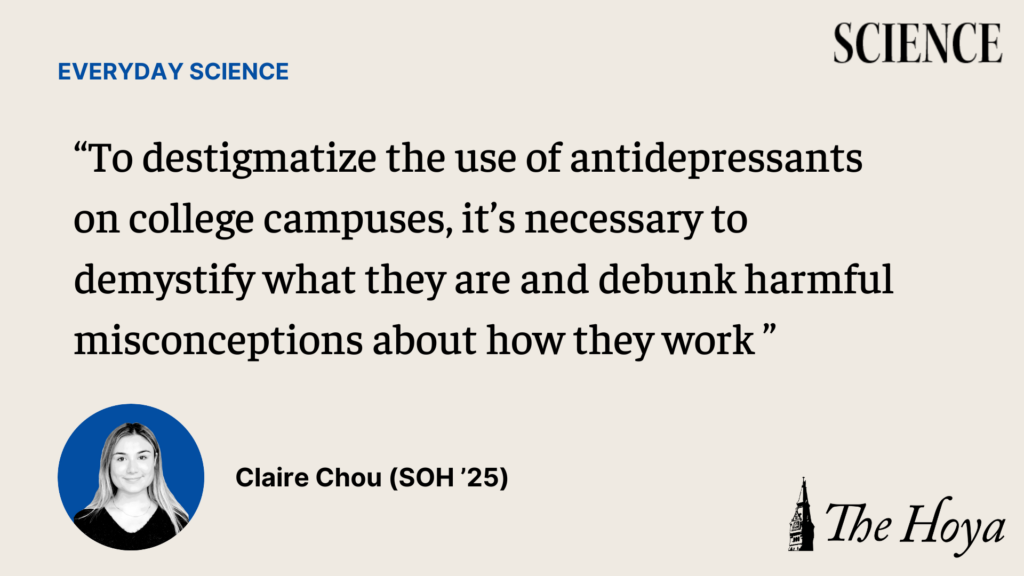Students at Georgetown University are no strangers to mental health issues. They tend to have higher levels of academic pressure, greater access to healthcare and more education about mental health compared to the general population. As a result, chances are you or someone you know takes medication to mitigate a mental health condition such as depression or anxiety.
However, taking medication for mental health can still be a taboo topic on campus, especially when it relates to depression.
To destigmatize the use of antidepressants on college campuses, it’s necessary to demystify what they are and debunk harmful misconceptions about how they work — which is what I hope to do in this installment of my column, “Everyday Science.”
In 2022, 27% of surveyed college students reported being diagnosed with depression at some point, according to an American College Health Association study. Additionally, the number of students taking antidepressants has increased from 8% in 2007 to 15% in 2018-19.
Nevertheless, misunderstandings about the purpose, effectiveness and consequences of using antidepressants still abound. One major misconception surrounding depression and antidepressant use is that it is a sign of weakness, or of succumbing to mental illness.
The argument that depression is a choice or the result of a lack of mental strength is refuted by the molecular nature of depression: it is a chemical imbalance in your brain that can inhibit mood regulation, which medication works to combat.
According to the chemical imbalance theory, depression arises from having insufficient levels of chemicals called monoamines, which are a type of neurotransmitter, or chemical signal, sent between nerve cells. These chemicals are responsible for a variety of central nervous system functions such as thinking and feeling.
To the best of our knowledge, antidepressants work by preventing nerve cells from taking up monoamines and stopping enzymes from breaking them down. Through these two methods, antidepressants make sure there are enough monoamines left in between nerve cells to keep communicating their signals to those cells. This boosts your brain’s efficiency at passing messages between neurons back up to normal levels, allowing processes such as stress and emotion regulation to continue smoothly.
Antidepressants target monoamines including serotonin, norepinephrine and dopamine, which are often more casually referred to as the “feel-good” molecules. Serotonin is responsible for mood regulation, as well as other key bodily functions including sleep, digestion and sexual desire. Norepinephrine is responsible for attention and stress reactions, and is utilized during a fight-or-flight response. Dopamine is responsible for pleasure and is linked to motivation, as it provides a mental reward for certain behaviors.
One way to mitigate the chemical imbalance at the root of depression is to let these “feel-good” neurotransmitters linger in your synapses, letting them continue to transmit messages of happiness and pleasure between neurons. Drugs labeled as “reuptake inhibitors” take advantage of this idea — they prevent your neurons from reabsorbing helpful neurotransmitters too quickly.
One type of reuptake inhibitor includes “selective serotonin reuptake inhibitors” (SSRIs), which are the most commonly prescribed type of antidepressant. These include Zoloft, Prozac and Lexapro.
The stigma surrounding antidepressants doesn’t end with the notion that depression is manufactured, however. Some argue that antidepressants are ineffective or only have a placebo effect.
Antidepressant efficacy, however, is backed by a breadth of trials that were randomized, placebo-controlled or double-blind, which means neither the researchers nor the participants knew if they were taking a placebo pill or an antidepressant. These strongly vetted trials have passed stringent regulatory checkpoints.
Anti-depressants are also more thoroughly tested than most other drugs, and the vast majority of medical literature points to their efficacy. In one study, 40-60% of people who took the antidepressant noticed an improvement in their symptoms within 2 months, compared to 20-40% of patients on placebo pills.
Taking antidepressants and going off antidepressants after long-term use can affect individuals differently in terms of efficacy and side effects, however. Some people with mild to moderate depression have experienced no more than placebo effects from antidepressants.
Overall, it is clear that the chemical imbalance theory is not a sufficient explanation for why depression occurs, meaning targeting a chemical imbalance through medication may not be sufficient treatment. Psychotherapy and antidepressant use combined seems to yield a better result than either alone. Lifestyle factors such as poor sleeping or eating patterns can also contribute to the onset or worsening of depression. On the upside, this means that empirically tested methods to boost well being such as mindfulness and physical activity offer another opportunity to mitigate depression.
Knowing that depression has scientifically backed explanations and treatments can be liberating for those experiencing depression and its symptoms. With a condition that can already take away one’s sense of agency, destigmatizing antidepressants can be an empowering conversation, and it is one that needs to be had on this campus.









